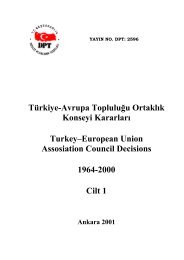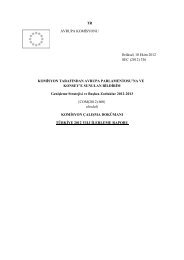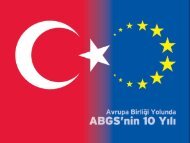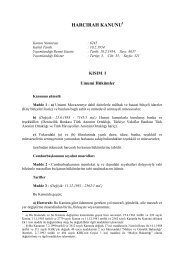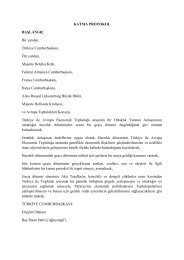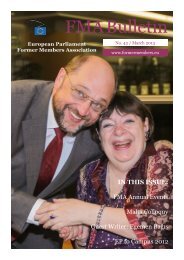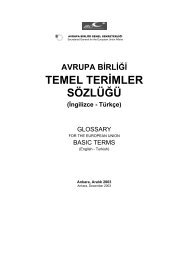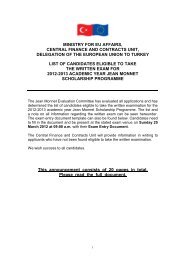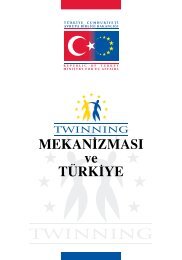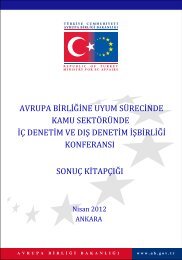2010 ilerleme raporu - Avrupa BirliÄi BakanlıÄı
2010 ilerleme raporu - Avrupa BirliÄi BakanlıÄı
2010 ilerleme raporu - Avrupa BirliÄi BakanlıÄı
Create successful ePaper yourself
Turn your PDF publications into a flip-book with our unique Google optimized e-Paper software.
COMMUNICATION FROM THE COMMISSION TO THE EUROPEAN<br />
PARLIAMENT AND THE COUNCIL<br />
Enlargement Strategy and Main Challenges <strong>2010</strong>-2011<br />
1. INTRODUCTION<br />
The EU's enlargement process has gained new momentum since the Commission adopted its<br />
last progress reports, notwithstanding the many other challenges the Union faces. The entry<br />
into force of the Lisbon Treaty ensures that the EU can pursue its enlargement agenda, while<br />
maintaining the momentum of European integration.<br />
Negotiations with Croatia have entered their final stage, demonstrating to all enlargement<br />
countries that accession can become a reality, provided the necessary conditions are fulfilled.<br />
Serbia has applied for membership. The Commission today issues its opinions on applications<br />
from Montenegro and Albania. Iceland began accession negotiations in July. New chapters<br />
have been opened in the negotiations with Turkey and the country has embarked on a<br />
thorough revision of its constitution, moving closer to European standards. Visa liberalisation<br />
for the Western Balkans has progressed. There have been significant break-throughs in longstanding<br />
bilateral differences between Slovenia and Croatia and a dialogue is under<br />
preparation between Serbia and Kosovo 1 . Post-conflict reconciliation among peoples has<br />
advanced and the countries themselves have started to take greater responsibility for regional<br />
cooperation.<br />
However, many challenges persist. In some enlargement countries the reform momentum has<br />
slowed down. All need to focus on good governance, improving the rule of law, speeding up<br />
economic reform and improving their capacity to adopt and implement the acquis. Upholding<br />
freedom of expression is a concern in most countries. Several complex problems remain to be<br />
solved, including the governance of Bosnia-Herzegovina and the name question concerning<br />
the former Yugoslav Republic of Macedonia. Open bilateral issues remain and differences<br />
over Kosovo's status have held up regional cooperation. As regards the Cyprus issue,<br />
negotiations on a comprehensive settlement have progressed but have not yet been concluded.<br />
The EU's commitment to the enlargement process reflects the Member States' conviction that<br />
it is in the mutual interest of the Union and the aspirant countries. This straight-forward<br />
message needs to be presented and explained clearly to the public in order to strengthen<br />
understanding and support for enlargement. The EU's enlargement process contributes to<br />
stability in Europe and to the security and well-being of its citizens. It provides a unique<br />
incentive for political and economic reform in the enlargement countries. It is in the mutual<br />
interest of the EU and enlargement countries to open discussions on difficult negotiating<br />
chapters early in the process. This process aims to bring the enlargement countries up to<br />
European standards in all areas covered by the EU treaties and thereby help the EU to attain<br />
its own objectives. These objectives today include dealing with the economic crisis and<br />
governance, restoring growth for jobs through the 2020 reform agenda, making the EU a safer<br />
place and pulling our weight on the world stage. The Commission's 2011 Work Programme<br />
includes a number of initiatives with these goals in mind.<br />
1 Under UNSCR 1244/99.<br />
EN<br />
2<br />
EN




